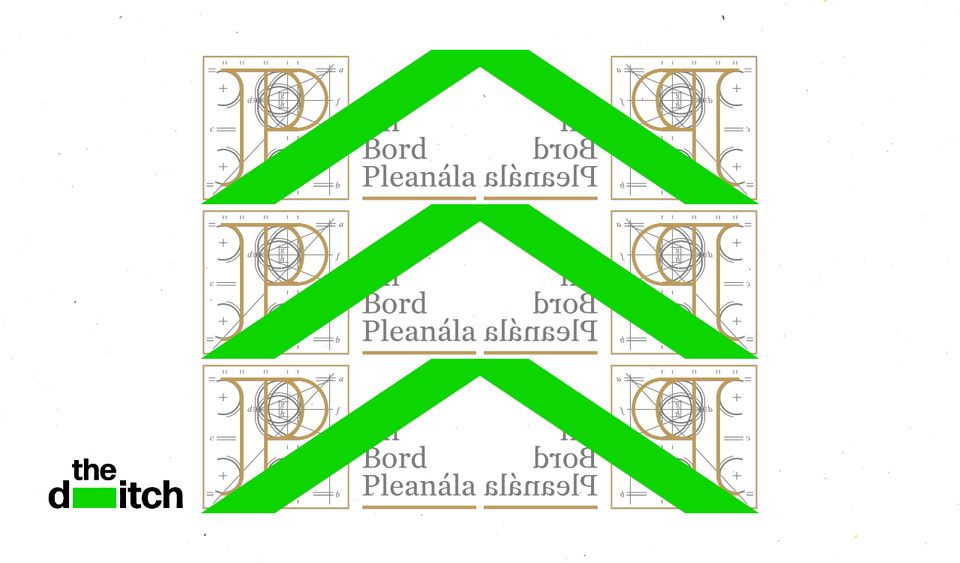An Bord Pleanála (ABP) didn’t charge a developer more than €750,000 in statutory fees the planning authority should’ve collected. The fees would’ve been used for infrastructure projects and other community services local to the development.
The state agency for transport infrastructure made a submission calling for at least part of these charges to be applied but ABP refused to do so.
The developer in question, EWR Innovation Park Ltd, separately applied for planning permission for a strategic housing development (SHD) at the same site, which would ultimately be quashed after a successful judicial review. While ABP case files are assigned at random, according to chairperson Dave Walsh, the same three board members – ex-deputy chairperson Paul Hyde, Michelle Fagan and Terry Prendergast – presided over both of EWR’s applications.
More than €200,000 towards Luas works
EWR Innovation Park Ltd in October 2019 sought planning permission from Dublin City Council for the unlawful use of a site it owns in Dublin’s Docklands.
It was alleged the developer had, without first seeking planning permission, divided and partitioned units in an industrial park before letting them to businesses. It was further alleged that EWR had carried out significant construction work on these units’ facades and surrounds in order to increase their rental income.
At the same time that EWR was seeking retention rights for this change of use, it was also seeking planning permission for a 337-unit strategic housing development at the same site. If ABP were to approve the SHD, the developer would set about demolishing the industrial park.
A submission to DCC read that it was “difficult to take this application at face value”, adding, “Clearly the owner cannot simultaneously both retain and demolish these units.”
“The applicant pleads that the application is required for the sake of the estate's viability, which is hard to understand if his intention is to knock it. As the estate has been in operation for 35 years, and the current owner bought it some two-and-a-half years ago, this claim lacks merit,” read the submission from Atlantic Diamond Ltd, a tenant at the park.
Among the submissions to DCC was a letter from state agency Transport Infrastructure Ireland (TII).
The letter said the proposed development was subject to a charge, calculated by site area, that would contribute to ongoing Luas works. TII asked DCC to apply this charge – provided for in law by the Planning and Development Act – to the developer.
“The proposed development falls within the area for an adopted Section 49 Supplementary Development Contribution Scheme Luas Red Line Docklands Extension (Luas C1) under the Planning and Development Act 2000, as amended. If the above application is successful and is not exempt, please include a condition to apply the section 49 Luas Line Levy,” read the TII letter.
While there are a number of exemptions to the charge, DCC’s policy is clear. “No reductions in whole or in part shall apply to permissions for retention of development,” reads the council’s Supplementary Development Contribution Scheme, Luas Red Line Docklands Extension guidelines.
As EWR’s application was for a retention, it could not be subject to an exemption.
At €38 per square metre for a 5,620 square metre development, EWR would have been charged €213,560, which would’ve been put towards Luas extension works.
More than €500,000 towards community services
EWR’s application to DCC was ultimately successful and the council didn’t apply the charge. Atlantic Diamond, the tenant behind the submission to DCC, appealed the council’s decision to ABP.
ABP planning inspector Máire Daly carried out a report on the site as part of this appeal. On the subject of these section 49 Luas works fees, she ignored DCC policy and advised against imposing the charge, writing, “I do not believe that the section 49 levy scheme should apply in the case of the current development.”
Daly did however leave it up to the board, writing, “If the board are minded to grant the development and differ in this opinion they may wish to attach a condition regarding levies.”
Similar to these section 49 charges are their section 48 counterparts, which are also provided for by the Planning and Development Act. These charges once collected contribute to “public infrastructure and facilities benefiting development in the area” according to DCC policy.
The council’s policy on where exemptions can apply for section 48 fees is similarly unambiguous to section 49 fees: “Exemptions and reductions shall not apply to permissions for retention of development.”
Though ABP planning inspector Daly referred to section 49 fees in her report, she didn’t mention section 48 fees, nor did DCC. There were no submissions from agencies like TII – which advised that section 49 charges should be applied – calling for their imposition.
With these charges coming in at €96 per square metre, EWR would’ve owed €539,520.
But ABP decided against hitting the developer with this bill. When it came time to rule in EWR’s favour, ABP ex-deputy chairperson Paul Hyde signed the order, which made no mention of either.
Combining the section 48 charges with the section 49 equivalent of €213,560, ABP failed to charge EWR a total of €753,080 – which would’ve contributed to public works in the area.
‘A certain laxity’
EWR also applied for and received planning permission for a 367-unit SHD at the same site as the industrial park. The same three ABP board members, Hyde, Michelle Fagan and Terry Prendergast, voted on both cases.
Atlantic Diamond took a successful judicial review against the SHD decision, with the High Court’s justice Richard Humphreys acute in his criticism of ABP for granting permission in the first place.
Humphreys in his judgment accused the planning agency of “a certain laxity in scrutiny, involving in effect the cutting and pasting of the developer’s materials, without adequate critical interrogation”.
An ABP spokesperson when asked by The Ditch about the failure to collect the more than €750,000 in charges said, “Please be advised that the board does not comment on its decisions after they are made.”


